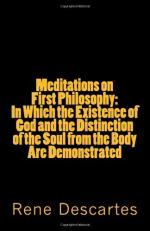Let us now put together these two truths equally certain. I am dependent upon a First Being even in my own will; and nevertheless I am free. What then is this dependent liberty? how is it possible for a man to conceive a free-will, that is given by a First Being? I am free in my will, as God is in His. It is principally in this I am His image and likeness. What a greatness that borders upon infinite is here! This is a ray of the Deity itself: it is a kind of Divine power I have over my will; but I am but a bare image of that supreme Being so absolutely free and powerful.
The image of the Divine independence is not the reality of what it represents; and, therefore, my liberty is but a shadow of that First Being, by whom I exist and act. On the one hand, the power I have of willing evil is, indeed, rather a weakness and frailty of my will than a true power: for it is only a power to fall, to degrade myself, and to diminish my degree of perfection and being. On the other hand, the power I have to will good is not an absolute power, since I have it not of myself. Now liberty being no more than that power, a precarious and borrowed power can constitute but a precarious, borrowed, and dependent liberty; and, therefore, so imperfect and so precarious a being cannot but be dependent. But how is he free? What profound mystery is here! His liberty, of which I cannot doubt, shows his perfection; and his dependence argues the nothingness from which he was drawn.
Sect. LXX. The Seal and Stamp of the Deity in His Works.
We have seen the prints of the Deity, or to speak more properly, the seal and stamp of God Himself, in all that is called the works of nature. When a man will not enter into philosophical subtleties, he observes with the first cast of the eye a hand, that was the first mover, in all the parts of the universe, and set all the wheels of the great machine a-going. The heavens, the earth, the stars, plants, animals, our bodies, our minds: everything shows and proclaims an order, an exact measure, an art, a wisdom, a mind superior to us, which is, as it were, the soul of the whole world, and which leads and directs everything to his ends, with a gentle and insensible, though omnipotent, force. We have seen, as it were, the architecture and frame of the universe; the just proportion of all its parts; and the bare cast of the eye has sufficed us to find and discover even in an ant, more than in the sun, a wisdom and power that delights to exert itself in the polishing and adorning its vilest works. This is obvious, without any speculative discussion, to the most ignorant of men; but what a world of other wonders should we discover, should we penetrate into the secrets of physics, and dissect the inward parts of animals, which are framed according to the most perfect mechanics.
Sect. LXXI. Objection of the Epicureans, who Ascribe Everything to Chance, considered.




